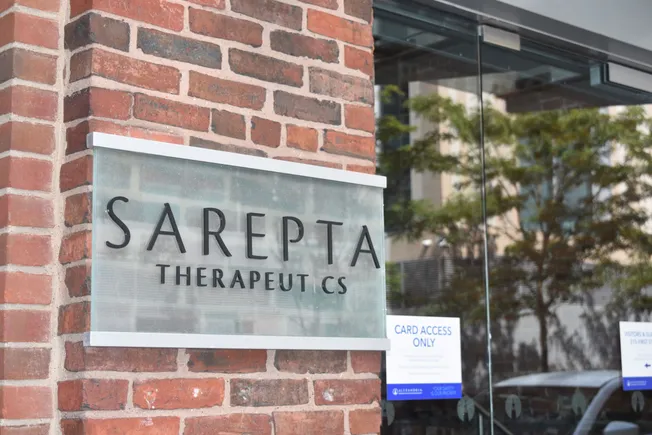Sarepta scraps a Duchenne drug as gene therapy sales rise


Dive Brief:
- Sarepta Therapeutics is giving up on an experimental drug for Duchenne muscular dystrophy as sales rocket for its approved gene therapy for the disease.
- The decision to discontinue SRP-5051 was based on several factors, company executives told analysts on a conference call Wednesday. Safety concerns, feedback from the Food and Drug Administration and the “evolving landscape of Duchenne” with the approval of Sarepta’s gene therapy Elevidys all played a role, Chief Scientific Officer Louise Rodino-Klapac told analysts and investors.
- Elevidys revenue climbed to $181 million in the third quarter from $122 million in the second quarter, beating analyst estimates of about $160 million. Sarepta also pulled in $9.5 million in royalties from Roche, which sells the gene therapy outside the U.S.
Dive Insight:
The end of SRP-5051 is disappointing, according to analysts, but Elevidys’ trajectory should more than make up for it. Sales of the gene therapy may top $2 billion next year, Leerink Partners analyst Joseph Schwartz wrote in a note to investors.
The third-quarter revenue jump for Elevidys came after the FDA expanded the therapy’s label in late June to make it available to the vast majority of people with Duchenne, a genetic disorder that usually affects boys and steadily causes their muscles to degenerate. Second-quarter sales for the product had fallen below analyst expectations, but executives expressed confidence that growing demand would lead to an uptick in revenue.
SRP-5051 is tailored to Duchenne patients who have mutations in exon 51 of the dystrophin gene, and the company saw it as a new-generation treatment to build on its approved therapy, Exondys 51. The drug was designed with an improved form of the “exon skipping” technology that underlies its predecessor. But testing showed that while SRP-5051 may be more effective than Exondys 51, it also led some patients to suffer from prolonged low levels of magnesium.
Originally, company officials thought the condition, known as hypomagnesia, could be managed and monitored, but it persisted in some patients even after they stopped treatment with the drug, Rodino-Klapac said. Now, the company has decided to stop development of SRP-5051 and so-called PPMO drugs like it.
Sales of Sarepta’s three marketed exon-skipping drugs, which include Exondys 51, are likely to continue to grow and won’t be affected much by competition from Elevidys until after next year, analysts said. Those medicines generated combined revenue of about $249 million in the third quarter.
“We support the company’s decision to discontinue the development of its PPMO franchise, given its first gene therapy appears to be a commercial success and is well on its way to being a blockbuster product,” William Blair analyst Sami Corwin wrote in a note to clients.
This post has been syndicated from a third-party source. View the original article here.




